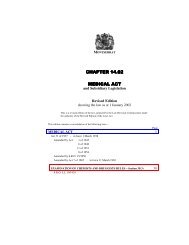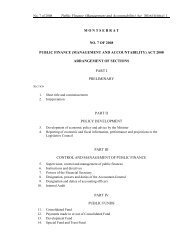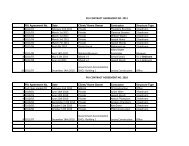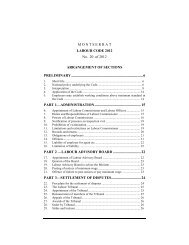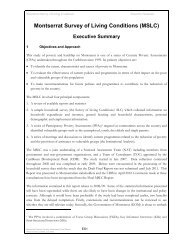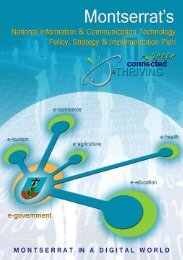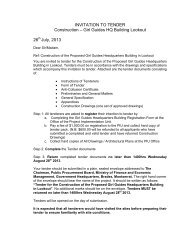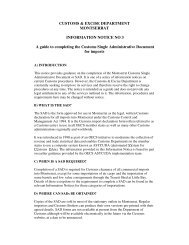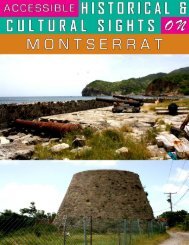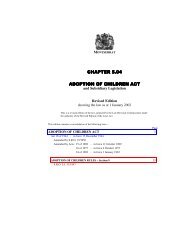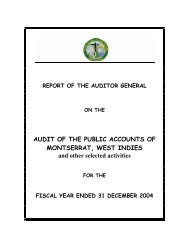Montserrat ECD Policy - Government of Montserrat
Montserrat ECD Policy - Government of Montserrat
Montserrat ECD Policy - Government of Montserrat
You also want an ePaper? Increase the reach of your titles
YUMPU automatically turns print PDFs into web optimized ePapers that Google loves.
NATIONAL POLICYFRAMEWORKONEARLY CHILDHOOD EDUCATION
to the content, relevance and appropriateness as well as to the methodology. It is alsoimportant that support material be made available to stimulate and expedite the learning/teaching process. Education For All Global Monitoring Report 2007 identified the quality <strong>of</strong>interaction between teacher or caregiver and child as the single most important determinant<strong>of</strong> programme success in early childhood.<strong>Montserrat</strong> recognizes that <strong>ECD</strong> programmes prepare young children for primary school, butalso contributes to the government national vision, consequently, an Early Childhood <strong>Policy</strong>is an essential national strategy in creating the much needed synergy in its educationdevelopment plans.2. Situational Analysis2.1 How Can Early Childhood Development Be DefinedEarly Childhood Development (<strong>ECD</strong>) in the <strong>Montserrat</strong>ian context refers to care, educationand development programmes and strategies geared toward children from birth to the age<strong>of</strong> eight. Early Childhood programmes integrate the cognitive, emotional, social, physical,spiritual, cultural, economic and creative environments and experiences <strong>of</strong> the child in a safeand caring environment thereby resulting in an individual who is well rounded, confidentproductive and able to make a meaningful contribution to the society in their adult years.2.2 History <strong>of</strong> <strong>ECD</strong> Programming in <strong>Montserrat</strong>In the early 1970s a group <strong>of</strong> concerned citizens saw the need for an organized approach tochildcare and formed the <strong>Montserrat</strong> Nursery School Association. They solicited fundingfrom <strong>Government</strong>, various donor agencies and the community for financing the school andtraining staff. By 1976 the association had established nine Nursery Schools in differentvillages throughout the island.In 1976 the <strong>Government</strong> appointed an Early Childhood Coordinator to direct and supervisethe services for children between ages three years and five years in the nine nurseryschools. After that the <strong>Montserrat</strong> Nursery School Association gradually phased out.During that same year (1976) the British Save the Children Fund with the permission <strong>of</strong> the<strong>Government</strong> <strong>of</strong> <strong>Montserrat</strong> established two Day Care Centres on the island which theyoperated until 1980. In 1980 the <strong>Government</strong> assumed full responsibilities for these centresand extended the responsibilities <strong>of</strong> the Coordinator Early Childhood Education to includesupervision <strong>of</strong> the Day Care Centres. The Roman Catholic Church also played its part duringthe period 1970-1977 when it operated a Nursery Centre for children 2-5years. In the 1980sthree private nurseries were organized by community individuals to cater for childrenbetween 2-5 years <strong>of</strong> age. Two <strong>of</strong> these centres continued to operate until the mid 1990swhen volcanic activity forced many persons to re-locate overseas and reduced the number<strong>of</strong> buildings available.The volcanic crisis caused a disruption in the provision <strong>of</strong> Early Childhood Educationbetween 1996-97. However, by 1998 two government operated nursery centres and a daycare centre re-opened.Presently this sector comprises the day cares catering for children under two years, nurseryor preschool setting for children five years and younger and early primary grades whichaccommodates children between five and eight years old in the Primary Schools. Thisdelineation fits in with the universally accepted definition <strong>of</strong> <strong>ECD</strong> 0-8 years and provides for a5
smooth transition and monitoring <strong>of</strong> the curriculum <strong>of</strong>fered at kindergarten to Grade 2.Further, the Five Year Education Plan 2002-2007 cited the provision <strong>of</strong> rich and stimulatingexperiences in well organized learning environment for children less than six years as one <strong>of</strong>its goals for this sector. In order to achieve this goal, government has since built one newcentre at Salem and expanded Lookout to cater for approximately 70 additional children.Funding to assist with this development came from the Caribbean Development Bank (CBD)and the Basic Needs Trust Funds (BNTF). Additionally, as early as 2006 the <strong>Government</strong>saw the need for the re-appointment an Education Officer with responsibility for <strong>ECD</strong>. Todate, 88% <strong>of</strong> Early Childhood Development Centres are <strong>Government</strong> owned. Attendance isnon-compulsory.Early Childhood Training in <strong>Montserrat</strong> has been ongoing over the years. 100% <strong>of</strong>practitioners have been exposed to training or are currently in training to the certificate levelfrom regional institutions. One practitioner who serves as Head <strong>of</strong> Centre has been trainedto a degree level in the field. Currently twenty (20) individuals including <strong>Government</strong> andprivately employed practitioners are pursuing a Certificate Course in Early Childhood Careand Development through the Open Campus <strong>of</strong> the University <strong>of</strong> the West Indies (UWI)2.3 Priorities Arising from Consultation on the development <strong>of</strong> the <strong>Policy</strong>The Early Childhood <strong>Policy</strong> was developed through a consultative approach in 2009-2010,the details <strong>of</strong> which are set out in Annex 1. During the consultation process there was astrong call for the policy to focus on:‣ The areas <strong>of</strong> training, certification and qualification <strong>of</strong> early childhoodpractitioners‣ The indicators <strong>of</strong> the type <strong>of</strong> person who should be allowed to work in thissector‣ Safe and healthy stimulating environments for children‣ Development <strong>of</strong> the child through the establishment <strong>of</strong> safe play areas inschools and communities‣ Provision for children with Special Education Needs and Disabilities.‣ Support for vulnerable children as well as children who at risk through poverty,and being affected by HIV/AIDS.‣ Support and Training for parents in the areas <strong>of</strong> child development.3 Pr<strong>of</strong>ile <strong>of</strong> the Sector6
The survey report emphasized that to address the interaction issues effectively (supervision,discipline and interactions between staff and children, children and children) it is necessaryto address programme structure and pedagogy, that is, how children learn and how staffsupport children’s learning. If these areas are not addressed over the medium to long term,the problems associated with inadequate interaction will persist and the opportunity forchildren to learn and develop to their potential in their early childhood centres will be lost.Areas requiring priority attention in the <strong>Government</strong> Centres were cited as space andfurnishing, personal care routines, language- reasoning/listening and talk, which points to theneed for curriculum,/programme structure, teacher training, parental understanding <strong>of</strong> thedevelopment stages <strong>of</strong> the child. There is also the need to improve working conditions <strong>of</strong>staff, as well as staff having sufficient time to engage parents and provide them withinformation. Generally, there is the need to strengthen the learning environment for thechild.The report further recommended that <strong>Montserrat</strong> establish access for teachers andcaregivers to qualification training. Programmes are in development in neighbouring OECScountries. CARICOM has a qualifications framework which includes early childhoodqualifications at Levels I, II and III and teacher qualifications at Associate and Bachelordegree levels. Therefore <strong>Montserrat</strong> has access to regional experience, materials andpedagogical approaches together with a qualifications framework on which to draw toestablish national systems for training and qualification.4 <strong>Policy</strong> Statement4.1 The Vision StatementThe vision for <strong>Montserrat</strong> has been proposed as:“The provision <strong>of</strong> high quality preschool education for all children living in <strong>Montserrat</strong> bypractitioners who are trained and qualified and understand the needs <strong>of</strong> all children with noexception, in a safe and caring environment.”4.2 Goals and ObjectivesThe strategic objectives <strong>of</strong> the <strong>Policy</strong> are to ensure that all children in <strong>Montserrat</strong> have theopportunity to access quality age-appropriate and developmentally sound early care,education and development.The specific goals that would be pursued to enable this are:1. To provide opportunities for all children between the ages <strong>of</strong> zero to eight years <strong>of</strong>age in <strong>Montserrat</strong> to participate in high quality early childhood programming;2. To provide and support training and ongoing pr<strong>of</strong>essional development for allpractitioners, and establish the level <strong>of</strong> certification needed for entry into this sector;3. To encourage and espouse partnership through effective parental and communityinvolvement in the development <strong>of</strong> their children;8
4. To promote and support the establishment <strong>of</strong> appropriate safe and healthyenvironments which meet the developmental needs <strong>of</strong> all children.4.3 Key StrategiesThe above goals and objectives will be achieved through the following strategies:1 Ensuring that all children living in <strong>Montserrat</strong> from birth to eight years have accessto quality early childhood education, care and development.2. Developing and introducing statutory regulations and guidelines, based on minimumstandards to support the effective delivery <strong>of</strong> the service.3 Providing training and certification at various levels at recognized institutions forall providers <strong>of</strong> early childhood services.4 Developing a common age-appropriate curriculum which supports the holisticdevelopment <strong>of</strong> the child, with a strong emphasis on methodologies which fosteran integrated, interactive and explorative learning process.5 Providing opportunities for children with Special Educational Needs (SEN) andDisabilities as well as all children who are generally seen as living in at risk situationssuch as poverty, abuse and HIV/AIDS.6 Strengthening and creating healthy, safe and secure learning environments for allchildren.7 Fostering sustainable linkages between the ministries and organizations in themanagement <strong>of</strong> this sector.8 Preparing key policy documents to provide guidance in areas such as nutrition,confidentiality and privacy, discipline and non-discrimination with the aim <strong>of</strong>strengthening the delivery <strong>of</strong> this sector.9. Providing support and educational opportunities for parents in an effort to assist themto understand and value the tremendous benefits associated with early childhooddevelopment.5.0. SPECIFIC ACTIONS AND TARGETS FOR IMPLEMENTING THE POLICYFRAMEWORKThis section sets out the specific actions to implement the identified strategies5.1.Ensuring that all children living in <strong>Montserrat</strong> from birth to eight years haveaccess to quality early childhood education, care and development.Specific actions to be undertaken are:‣ Amendment to the Education Act # 1 <strong>of</strong> 2004 Chapter 1V Part 2 section 73 (1) page62 to include children <strong>of</strong> ages 0-8 instead <strong>of</strong> one year <strong>of</strong> age or older but under sixyears <strong>of</strong> age.‣ Establishment <strong>of</strong> a Register <strong>of</strong> all children born and residing on the island as well asbirths to <strong>Montserrat</strong>ian citizens recorded overseas to be maintained by the9
<strong>Government</strong> for use by the Ministry <strong>of</strong> Education. This will assist to provide data forprojecting requirements for the future establishment <strong>of</strong> early childhood services‣ Promotion <strong>of</strong> inter-ministerial and agency collaboration to provide services forchildren in the early years - health, education, family services, social transformation,community services, and private sector.‣ Identification <strong>of</strong> the incidence <strong>of</strong> home based ‘child minding’ services and theestablishment <strong>of</strong> registration and support mechanisms for child minders in order toensure safe, quality services5.2. Developing and introducing statutory regulations and guidelines, basedon minimum standards to support the effective delivery <strong>of</strong> the serviceSpecific actions to be undertaken are‣ Adoption <strong>of</strong> Regulations and Standard for early childhood services together withestablishment <strong>of</strong> mandatory registration and licensing <strong>of</strong> all service providers usingthe CARICOM Regional Guidelines.‣ Establishment <strong>of</strong> in-service and qualification training standards for <strong>of</strong> all providers <strong>of</strong>early childhood services to meet the requirements <strong>of</strong> the Regulation and Standards inthe delivery <strong>of</strong> the service.‣ Establishment <strong>of</strong> a register <strong>of</strong> child minders providing early childhood care anddevelopment in their homes. This will assist the <strong>Government</strong> to provide thenecessary support and training in order to assist them to meet minimum standards inthe delivery <strong>of</strong> quality services.‣ Review <strong>of</strong> the job descriptions <strong>of</strong> all Heads and other persons employed by<strong>Government</strong> in the delivery <strong>of</strong> Early Childhood Services to ensure compliance andharmonization with the standards.5.3. Providing training and certification at various levels at recognized institutions forall providers <strong>of</strong> early childhood services.Specific actions to encourage the pr<strong>of</strong>essional development <strong>of</strong> practitioners will establishclear guidelines and requirements for entry <strong>of</strong> persons into this sector. It will also stipulatethe requirement for leadership level at management level <strong>of</strong> early childhood developmentcentres, as well as provide guidance as to the pr<strong>of</strong>ile <strong>of</strong> suitable persons working withchildren in accordance with CARICOM and assess the demand and human resourcesrequired to meet the demands <strong>of</strong> training for practitioners.Specific actions to achieve this include:‣ Drafting <strong>of</strong> a minimum entry level document for persons wishing to enter the earlychildhood sector.‣ Drafting <strong>of</strong> document on criteria and qualification level for managers/ leaders <strong>of</strong>centres.‣ Creating links with regional training programmes in early childhood programmes -such as the Antigua and Barbuda State College – to create access for10
<strong>Montserrat</strong>ians e.g. through accessing <strong>Montserrat</strong>ian students to the AntiguaBarbuda State College or through summer courses held in <strong>Montserrat</strong> supported bytutors from Antigua Barbuda State College‣ Assessment <strong>of</strong> the human resources on island available to conduct training <strong>of</strong>practitioners along with the cost implications <strong>of</strong> training.‣ Creation <strong>of</strong> a register <strong>of</strong> institutions in the region <strong>of</strong>fering programmes <strong>of</strong> study inEarly Childhood Care and Development which meet the specific needs in <strong>Montserrat</strong>.‣ Development <strong>of</strong> a “ career path” to link practitioners in this sector to teacher training‣ Setting <strong>of</strong> a time frame for all early childhood practitioners to receive training and toobtain a minimum qualification‣ Establishment <strong>of</strong> mandatory training for all practitioners and managers <strong>of</strong> centres inunderstanding Special Educational Needs, First Aid and Cardio PulmonaryResuscitation (CPR) Management and Leadership training among others‣ Reorientation and retraining <strong>of</strong> practitioners to work with children at differentdevelopmental levels in order to equip practitioners with the skills to promote andengage children in self directed learning activities.‣ Exposing practitioners to short regional or international workshops as wellprogramme <strong>of</strong> long term on-site training which will expose them to modern andeffective curriculum practices as well as motivate them to carry out research on thecurriculum and to work towards solutions which would further enhance this sector.5.4 Developing a common age-appropriate curriculum which supports the holisticdevelopment <strong>of</strong> the child, with a strong emphasis on methodologies which foster anintegrated, interactive and explorative learning processThere will be specific consultation and discussion on the development <strong>of</strong> a harmonizedinteractive curriculum for all early childhood providers. Training manuals and audiovisualresources will be created to guide practitioners. Supporting parents will be a strongcomponent, and parents will be <strong>of</strong>fered orientation in the curriculum in order to encouragestrong school-parent collaborationSpecific actions will include:‣ Regional and international curricula to be selected for review in the context <strong>of</strong> the policyand vision for early childhood adopted in <strong>Montserrat</strong>.‣ Curriculum to be developed, drawing on international/regional examples if applicable, inconsultation with practitioners and in accordance with the Caribbean Learning Goals andOutcomes‣ Curriculum developed to include attention to transition from home to early childhoodsetting and from early childhood setting into the kindergarten setting.‣ Implementation <strong>of</strong> the recommendations <strong>of</strong> the survey <strong>of</strong> the Quality <strong>of</strong> LearningEnvironments 2009 with particular respect to the provision <strong>of</strong> learning activities, supportfor language and reasoning, and programme structure amongst others.11
‣ Operators to receive continuous training in the area <strong>of</strong> inclusive service provision,which would help improve the service which they deliver in this area.‣ A mapping exercise to be conducted to collect data on the number <strong>of</strong> children in<strong>Montserrat</strong> who are not accessing early childhood services5.6 Strengthening and creating healthy, safe and secure learning environments forall childrenHealthy, safe and secure learning environments will be guided by the standard adopted forthe early childhood sector and <strong>Government</strong> policy on the creation <strong>of</strong> mini-parks incommunities and preschool.Specific actions include:‣ Implementation <strong>of</strong> the recommendations <strong>of</strong> the survey on Quality <strong>of</strong> LearningEnvironments 2009 with respect to the health, safety and security requirements inearly childhood settings.‣ Establishment <strong>of</strong> well furbished age appropriate mini-play parks in communities tomeet the needs all children.‣ Education <strong>of</strong> parents and community, as to the benefits <strong>of</strong> these play areas asimportant to the development <strong>of</strong> the child.‣ Education <strong>of</strong> the public as it relates to their civic duty in the preservation <strong>of</strong> these playareas.‣ Education <strong>of</strong> the children in the safe usage <strong>of</strong> the equipment which will be placedwithin the centres and the community mini-parks.5.7 Fostering sustainable linkages between the ministries and organizations in themanagement <strong>of</strong> this sectorIt has been established that to meet the need <strong>of</strong> the child in a holistic manner closecollaboration among all ministers, agencies and NGOs is needed. The <strong>Government</strong> willpromote inter-sectoral collaboration and management where appropriate.Specific actions include:‣ Establishment <strong>of</strong> the National Council <strong>of</strong> Early Childhood Development (NC<strong>ECD</strong>)provided for in Part 1V Division 1 Section 108 (1) and (2). This Council will berepresented by all sectors working on matters relevant to children and will serve asthe Advisory body to the Minister <strong>of</strong> Education.‣ A collaborative approach within the Ministry <strong>of</strong> Education to plan and implement theselected curriculum in early childhood centres and in the first three years <strong>of</strong> primaryschool.‣ A follow up sensitization process which will educate the public on the <strong>Government</strong>’sapproved early childhood policy.‣ Collaboration through MOU among ministries and other agencies, such as theprivate sector to be the advocates for issues as they relate to children.13
Kilarc Powerhouse and SwitchyardProposal for Disposition• Work includes removal <strong>of</strong> turbines and generators and all associated electrical and mechanicalequipment associated with the powerhouse and abandoning the structure in place.• Turbine pits will be filled with mass concrete or other suitable fill material and capped withconcrete.• All openings will be sealed and the tailrace backfilled to the confluence using local earth materials.• The building will remain in place; the long-term disposition <strong>of</strong> the structure needs to bedetermined.• The switchyard will be left in place as it is an integral part <strong>of</strong> the PG&E inter-connectedtransmission system.Cow Creek Development Decommissioning ProposalThe South Cow Creek watershed encompasses approximately 78 square miles (mi 2 ), including 53 mi 2 locatedupstream from the South Cow Creek Diversion Dam. The average annual run<strong>of</strong>f at the dam is 79,500 ac ft;on average, approximately 37 percent <strong>of</strong> the annual run<strong>of</strong>f is diverted to Cow Creek Powerhouse. Theestimated dependable generating capacity <strong>of</strong> the Cow Creek development is approximately 400 kW, and theestimated average annual energy generated is 12 million kWh.The Cow Creek Development features include:• Mill Creek Diversion Dam;• Mill Creek-South Cow Creek Canal;• South Cow Creek Diversion Dam and Main Canal;• Cow Creek Forebay Dam; and• Cow Creek Forebay, Penstock, and Powerhouse.The Mill Creek–South Cow Creek Canal diverts water from Mill Creek to South Cow Creek. From SouthCow Creek, the water is diverted to the South Cow Creek Main Canal and into Cow Creek Forebay. FromCow Creek Forebay, the water flows through a penstock to Cow Creek Powerhouse. The water is thendischarged from the powerhouse to Hooten Gulch where it flows to South Cow Creek.Mill Creek Diversion – Dam and Canal IntakeProposal for Disposition• Work includes the demolition and removal <strong>of</strong> materials from the site.• Demolition may require construction <strong>of</strong> a temporary channel diversion.Cultural Resources Inventory and EvaluationGarcia and Associates (GANDA)Kilarc-Cow Creek Hydroelectric Decommissioning Project 6 March 12, 2009
7. Management, Monitoring and Evaluation MechanismsThe Ministry <strong>of</strong> Education through the Education Officer with responsibility for EarlyChildhood Development will manage the day to day activities <strong>of</strong> the sector. There will beclose networking with the Curriculum Officer as well as the Education Officer <strong>of</strong> Primaryschools. The EO <strong>ECD</strong> will report to the Director <strong>of</strong> Education (DOE)Upon establishment <strong>of</strong> the National Council <strong>of</strong> Early Childhood Development (NC<strong>ECD</strong>), it willwork in close collaboration with the <strong>Montserrat</strong> Early Childhood Association (MECA) and theEO <strong>ECD</strong>. The Council will act as the main advisory body to the Minister who in his capacitycan delegate specific tasks to them as it relates to the sectorThe Education Officer, will have the responsibility for the development <strong>of</strong> the monitoring andinspection process working in conjunction with the NC<strong>ECD</strong>, and MECA. The Officer will alsoconduct inspection for awarding licenses to the centres, assess the progress <strong>of</strong> the childrenwithin the centres at least twice a year and produce an annual report to the Minister and theNC<strong>ECD</strong> on the state <strong>of</strong> the sector.The EO <strong>ECD</strong> will have the responsibility <strong>of</strong> advising the Minister <strong>of</strong> Education on the need forreviews and amendments to the sector whenever the landscape <strong>of</strong> <strong>ECD</strong> in <strong>Montserrat</strong> sorequires.The sector will continue to operate under the various sections <strong>of</strong> the Act and any otherprotocols <strong>of</strong> the <strong>Government</strong> <strong>of</strong> <strong>Montserrat</strong> which so refer to the sector.8. Implementation PlanAnnex II contains an indicative schedule for implementing the <strong>Policy</strong>. The schedule indicatesthat work on all <strong>of</strong> the proposed strategies could be initiated within a three year period.There is also referencing that collaboration will be needed between various <strong>Government</strong>Department for example the Attorney General’s Office.Successful implementation will also require technical and financial assistance. The <strong>Policy</strong>will be implemented through the development <strong>of</strong> Annual Action Plans which will identify theactivities <strong>of</strong> priorities to be undertaken during the applicable financial year, or as funding issourced. The priority Action Plan for the first year <strong>of</strong> implementation is detailed in Annex III.It focuses on the necessary legislative changes which would be required to enable acohesive and functional early childhood service as well as the collection <strong>of</strong> data on allexisting providers along with the education <strong>of</strong> the general public.9. Year One Priority Action Plan.The priority actions to be implemented during the first year are:1. Amendment to the Education Act2. Approval and dissemination <strong>of</strong> <strong>Policy</strong>3. Establishment <strong>of</strong> a Register <strong>of</strong> all children born and residing on the island as well asbirths to <strong>Montserrat</strong>ian citizens residing overseas4. Orientation <strong>of</strong> practitioners to <strong>Policy</strong> implementation and development <strong>of</strong> theMinimum Standards5. Assessing the number <strong>of</strong> home based early childhood services and the need forregistration and training15
6. Registration System established and schedule drawn up for registration <strong>of</strong> all serviceproviders, including home based providers7. Education Awareness for all stakeholders8. Providing CPR and First Aid Training for all practitioners and other relevant personswho work at the Centres e.g. cook bus drivers etc.9. Appointment <strong>of</strong> persons to sit on the Council <strong>of</strong> Early Childhood Education ( CECE)as provided under the Act10. Centres moves towards meeting Standards11. Involvement <strong>of</strong> Partners12. Volunteerism- Support for Early Childhood Development..16
REFERENCES AND SOURCESBurns, Sheron, Early Childhood Education Customer Survey, 2007Education Act, No. 1 <strong>of</strong> 2004, <strong>Montserrat</strong>Gittens Kemberly, Children and AIDS: A Stocktaking Report on <strong>Montserrat</strong> 2007Health Systems and Services Pr<strong>of</strong>ile <strong>of</strong> <strong>Montserrat</strong> 1 st Ed. July 20, 2001Hansen K. and Hawkes D., Early Childcare and Child Development,Journal <strong>of</strong> Social <strong>Policy</strong>,Vol. 38 April 2009.Ministry <strong>of</strong> Finance Economics development and Trade, Statistic department, <strong>Montserrat</strong> ,2008.National Child Protection Action Plan <strong>of</strong> the <strong>Government</strong> <strong>of</strong> <strong>Montserrat</strong>, March 12 th 2007Regional Guideline for Developing <strong>Policy</strong>, Regulation and Standards in Early ChildhoodDevelopment Services, CARICOM 2008Report <strong>of</strong> a Survey on the Quality <strong>of</strong> Learning Environments in Early Childhood Centres,<strong>Government</strong> <strong>of</strong> <strong>Montserrat</strong>, 2009Schweinhart Lawrence J, PhD, Benefits, costs, and Explanation <strong>of</strong> High scope PerryPreschool Program, A paper presented at the meeting <strong>of</strong> the Society for Research in ChildDevelopment, Tampa Florida, and April 26 th , 2003United Nations Convention on the Rights <strong>of</strong> the Child (CRC) Office <strong>of</strong> the High Commissionfor Human rights, November 1989, Effective September 1990.White Linda A, Early Childhood Care and Development <strong>Policy</strong> , Volume 34, 2004World Bank Report, Early Childhood Education and Development in Indonesia- AnInvestment for a Better Life, 200217
ANNEX I<strong>Policy</strong> Process<strong>Montserrat</strong> is in the stage <strong>of</strong> re-development following the eruption <strong>of</strong> Soufriere Hills volcanowhich began in 1995, and has left the country in a constant state <strong>of</strong> alert. The capitalPlymouth has been abandoned and Brades, a rural village on the northern coast <strong>of</strong> theisland is being developed as the new capital. The daily challenges <strong>of</strong> ash have nothampered the motivation and the zeal <strong>of</strong> the people who continue to live on the island. Thereis a renewed thrust towards strengthening and improving the quality and standards <strong>of</strong>education for all the people.Presently, there is a focus on Early Childhood Care and Development (ECCD) and in 2008the present Education Officer responsible for <strong>ECD</strong> submitted a proposal to UNICEF forassistance to develop <strong>Policy</strong>, Regulation and Standards and an Implementation Plan for theEarly Childhood sector. This proposal was accepted and in late 2009 the process began.The development <strong>of</strong> the <strong>Policy</strong> Framework has followed the recommended phases as set outin the CARICOM Regional Guidelines for Developing <strong>Policy</strong>, Regulation and Standards inEarly Childhood Development Services 2008: The Preparation steps were carried outfollowed by the <strong>ECD</strong> Situation Analysis conducted by UNICEF in June 2009.The consultative process included:Meetings with the Management Team <strong>of</strong> the MOE.Several consultation meetings with other governmental agencies, the private sector,NGOs and the general public. Annex 1Media coverage to provide a high level <strong>of</strong> sensitization to the Diaspora <strong>of</strong> <strong>Montserrat</strong>Referencing the guidelines set out by CARICOM “Guidelines for Developing <strong>Policy</strong>,Regulation and Standards in Early Childhood Development Services, 2008 “ at allconsultations in order to educate the public on this documentMeetings with various personnel in Ministries e.g. Education, Health, EconomicDevelopment and Trade and Legal Department.Meeting with civil society and persons from various pr<strong>of</strong>essional bodies18
Referencing research on regional and international work as they pertain to EarlyChildhood Care and Development.The aims <strong>of</strong> such wide spread consultations were to:1. Garner the thoughts <strong>of</strong> the MOE as to its vision and goals for the development <strong>of</strong> the<strong>ECD</strong> sector2. Arrive at a common consensus as to terminology which would be used in thedocument.3. Sensitize the general public to the importance and relevance <strong>of</strong> <strong>ECD</strong> as well as togive individuals and groups a voice in the development <strong>of</strong> such a critical document4. Illicit the opinion <strong>of</strong> these stakeholders and to hear how they see themselves in thedevelopment <strong>of</strong> Early Childhood and Development (<strong>ECD</strong>) in <strong>Montserrat</strong> and how theycould work along with the Ministry <strong>of</strong> Education (MOE) to create and support thissub-sector5. Commence the process <strong>of</strong> ownership <strong>of</strong> the final document.It can be reported that the process was a participatory and collaborative one, which broughttogether as far as possible the major stakeholders <strong>of</strong> this sector; and provided an opportunityfor persons to voice their concerns or make recommendations for the sector.19
ANNEX 11Implementation PlanCreation <strong>of</strong> an Implementation Plan is a critical component to the National <strong>Policy</strong> on EarlyChildhood Development ( <strong>ECD</strong>) and should be a collaborative effort between the consultantand the relevant Ministry <strong>of</strong> the recipient <strong>Government</strong> through its various experts.This draft Implementation Plan will serve as a guide, as to the areas which have beenidentified as priorities if the <strong>Policy</strong> is to be functional.The areas identified were recurring themes <strong>of</strong> discussion during the consultations. Theactivities have been identified and placed under various headings such as1. The legislative changes needed to amend the Education Act2. Initiating the Institutional Framework through strengthening support for EarlyChildhood Services ( ECS)3. Improving the Quality <strong>of</strong> Service Providers4. Training <strong>of</strong> Practitioners5. Stimulating, safe and healthy environments6. Creation <strong>of</strong> safe Play areas at the centers and communities.The areas <strong>of</strong> the One Year Implementation Plan has been outline on pages 12-13, thisillustrates the areas for immediate action. This is followed by the three year plan.The Three Year Implementation Plan has been further subdivided to illustrate the timeframe in months and colour coded. Orange represent the long term activities / areas whichwill require further technical and financial assistance from funding agencies such asUNICEF, green those that can be achieved in the medium term with further available andallocated government budget and blue activities that can be achieved with <strong>ECD</strong> allocatedbudget and expertise.Areas <strong>of</strong> the Implementation Plan which can be commenced immediately , since theyrequire very little funding has been extracted and further developed as the year one workplan.Colour Codes Requires technical and financial support Requires government allocated input and budgeting Requires use <strong>of</strong> ECE budget and expertise20
ACTIONSYEAR 1 IMPLEMENTATION PLAN - MONTSERRAT2010 2011JUL AUG SEP OCT NOV DEC JAN FEB MAR APR MAY JUN3. Creation <strong>of</strong> a Register <strong>of</strong> All children born and residing on the island as well as births to <strong>Montserrat</strong>ian citizens residing overseas.Collation <strong>of</strong> information on island from relevant ministries with regard to birthsCollection <strong>of</strong> information on arrivals <strong>of</strong> citizens returning from overseas with youngchildrenCollection <strong>of</strong> information on prenatal attendance, birth , immunization <strong>of</strong> children fromall Health CentresCollection <strong>of</strong> information on registration <strong>of</strong> children at day care and PreschoolCreation <strong>of</strong> data base at the relevant Ministry to cross check information.4. Orientation <strong>of</strong> PractitionersCopies <strong>of</strong> document sent to all centres and made available to registered operators.Group sessions with practitioners5. Assessment <strong>of</strong> the number <strong>of</strong> “home-based” early childhood service providersDesign Survey Tool for recording information on each “ child-minder”Make contact with persons to inform them on the intention <strong>of</strong> the registration/surveyCarry out surveyData entered into the MOE <strong>ECD</strong> information systemAnalyze information garnered and plan type <strong>of</strong> assistance which will be provided22
ACTIONSYEAR 1 IMPLEMENTATION PLAN - MONTSERRAT2010 2011JUL AUG SEP OCT NOV DEC JAN FEB MAR APR MAY JUN8. CPR and First Aid Training for all practitioners.Sourcing <strong>of</strong> organization e.g. Red Cross to fashion curriculum specific to the ECE age groupfor First Aid and CPR training.Agreement on cost implication.EO ECE refers cost to P.S. MOE.Agreement as to how cost is to be met agreed on .Funding Proposal for training written and set to UNICEF / other fundersSet date for commencement <strong>of</strong> training agreed on.Selection <strong>of</strong> practitioners for first phase training agreed on.24
ACTIONSYEAR 1 IMPLEMENTATION PLAN - MONTSERRAT2010 2011JUL AUG SEP OCT NOV DEC JAN FEB MAR APR MAY JUN9. Support for Early Childhood <strong>Policy</strong>Agreement on the composition <strong>of</strong> members for the Council on Early Childhood Education( CECE)Preparation <strong>of</strong> pr<strong>of</strong>ile <strong>of</strong> individuals for submission to Cabinet..Adoption <strong>of</strong> submission by Cabinet .Cabinet conclusion issued.Names <strong>of</strong> members <strong>of</strong> CECE gazetted.Governor-in-Council appointedConvening initial meeting <strong>of</strong> CECE10. Centres move towards meeting StandardsCabinet approval <strong>of</strong> Standards.EO ECE working along with Lead Practitioners and Representative <strong>of</strong> CECE and MECA todevelop monitoring proceduresProcedures shared and discussed with all practitionersRevision and feedback taken into accountPublication <strong>of</strong> procedures Manual, dissemination to all stakeholdersACTIONSYEAR 1 IMPLEMENTATION PLAN - MONTSERRAT25
2010 201111. Involvement <strong>of</strong> PartnersJUL AUG SEP OCT NOV DEC JAN FEB MAR APR MAY JUNEO ECE to prepare position Paper on a case for <strong>of</strong>fering an elective at the <strong>Montserrat</strong>Community College .EO ECE to have initial meeting with Minister <strong>of</strong> Education and other members <strong>of</strong> theAdministrative Team position paper to be sharedMeeting with Principal <strong>of</strong> MCC set up , invited to this meeting to share and brainstormPosition paper would be DOE, Director Open Campus, Rep CECE, and any other delegatedindividualCommittee set up to carry feasibility study /surveyFindings presentedCommittee to commence looking at models/curriculum/human resources available /needed for such a programmeDraft documents prepared in terms <strong>of</strong> what is available/ costing / interest.Findings presented to Minister <strong>of</strong> EducationMinister appraise CabinetCabinet approval and time frame set for pilot programme26
ACTIONS12. Volunteerism - Support for ECEYEAR 1 IMPLEMENTATION PLAN - MONTSERRAT2010 2011JUL AUG SEP OCT NOV DEC JAN FEB MAR APR MAY JUNEO ECE prepares concept paper and meets with Lead PractitionersLead Practitioners and EO ECE develop Expectations for Student Volunteers ( ESV)EO ECE meets with MOE Admin Team and shares concept paper and ESVEO ECE meets with Principal <strong>of</strong> MCCEO ECE invited to address MCC students on the subject <strong>of</strong> voluntarism in ECEStudents who have an interest will sign up with MCC on the assigned FormParental Consent Forms are sent outOrientation follows after Parental consent forms have been returnedSchedule <strong>of</strong> placement/time and supervisor is preparedCommencement <strong>of</strong> Pilot on Volunteerism at ECE Centres.NB: Arrows indicate activity falling into subsequent period.27
MONTSERRAT EARLY CHILDHOOD EDUCATION – 3 YEAR PLANYEAR 1 YEAR 2 YEAR 3ACTIONS2010 2011 2012 2013JUL AUG SEP OCT NOV DEC JAN FEB MAR APR MAY JUN JUL AUG SEP OCT NOV DEC JAN FEB MAR APR MAY JUN JUL AUG SEP OCT NOV DEC JAN FEB MAR APR MAY JUN1. Amendment to Education Act to include 0-8 year oldsMinister to prepare paper on the sections <strong>of</strong>the Act to be amendedMinister to prepare paper on the sections <strong>of</strong>the Act to be amendedAttorney General's Office draft amendmentsAmendment sent to CabinetCabinet sanctions amendments forlegislatureCabinet may wish for amendments to the Actto be gazetted2. <strong>Policy</strong>, Regulations and StandardsSubmission <strong>of</strong> draft Regulations and <strong>Policy</strong>for Cabinet approvalLegal review <strong>of</strong> draft policy and Standards byDraft Legal Counsel in the AG 's OfficeGazetting <strong>of</strong> early Childhood <strong>Policy</strong> andStandards.3. Registration <strong>of</strong> All service providers <strong>of</strong> early ChildhoodEO ECE to design a form to capture allrelevant information needed.Form piloted using at least the oneregistered private operator and at least five<strong>Government</strong> centresRelevant changes made to formUse <strong>of</strong> <strong>Government</strong> PR as well as radiostations to announce intention and reasonsfor the exerciseVenue time and collection <strong>of</strong> Forms, timeframe for returning forms established anddisseminated .4. Orientation <strong>of</strong> PractitionersCopies <strong>of</strong> document sent to all centres andmade available to registered operators.Group sessions with practitioners5.Providing support and educational opportunities for parents in an effort to assist them in understanding and valuing the tremendous benefits associated with early childhood.Workshops on the development stages <strong>of</strong>children held for parentsSelection <strong>of</strong> representative parents andpractitioners to meet and prepare Booklet .28
ACTIONSOne day workshop held on the writing <strong>of</strong>bookletBooklet completed and disseminated to allcentres for discussion/ feedback .Booklets edited and ready for printing .Books PrintedBooklet distributed to all ECE Centres.Family Activities heldRegular parent teacher Conferences held6. Education Awareness <strong>of</strong> All stakeholdersTown Hall meetingUse <strong>of</strong> media house to promote awareness.Print media used fortnightly to promoteawareness <strong>of</strong> <strong>Policy</strong> and Standards.Publication <strong>of</strong> document on <strong>Government</strong>website.7. CPR training for all practitioners.Sourcing <strong>of</strong> organization e.g. Red Cross t<strong>of</strong>ashion curriculum specific to the ECE agegroup for First Aid and CPR training.Agreement on cost implication.EO ECE refers cost to P.S. MOE.Agreement as to how cost is to be metagreed on .Funding Proposal for training written and setto UNICEF / other fundersSet date for commencement <strong>of</strong> trainingagreed on.Selection <strong>of</strong> practitioners for first phasetraining agreed on.8 .Support for Early Childhood <strong>Policy</strong>Agreement on the composition <strong>of</strong> membersfor the Council on Early ChildhoodEducation ( CECE)Preparation <strong>of</strong> pr<strong>of</strong>ile <strong>of</strong> individuals forsubmission to Cabinet.Adoption <strong>of</strong> submission by cabinet .Cabinet conclusion issued.MONTSERRAT EARLY CHILDHOOD EDUCATION – 3 YEAR WORK PLANYEAR 1 YEAR 2 YEAR 32010 2011 2012 2013JUL AUG SEP OCT NOV DEC JAN FEB MAR APR MAY JUN JUL AUG SEP OCT NOV DEC JAN FEB MAR APR MAY JUN JUL AUG SEP OCT NOV DEC JAN FEB MAR APR MAY JUN29
MONTSERRAT EARLY CHILDHOOD EDUCATION – 3 YEAR WORK PLANYEAR 1 YEAR 2 YEAR 3ACTIONS2010 2011 2012 2013JUL AUG SEP OCT NOV DEC JAN FEB MAR APR MAY JUN JUL AUG SEP OCT NOV DEC JAN FEB MAR APR MAY JUN JUL AUG SEP OCT NOV DEC JAN FEB MAR APR MAY JUNNames <strong>of</strong> members <strong>of</strong> CECE gazetted.Governor-in-Council appointedConvening initial meeting <strong>of</strong> CECEAppointment <strong>of</strong> one additionalEducation OfficerCurriculum supportNational Curriculum for ECCD sourcedWorkshops for retraining <strong>of</strong>practitioners and parentsSupport for children with SEN anddisabilitiesStudy on the types and location <strong>of</strong>childrenForms and types <strong>of</strong> AssessmentReferral System developedTraining <strong>of</strong> practitionersTransition Study carried outTransition <strong>Policy</strong> from preschool toprimary school developed9. Centres move towards meeting StandardsCabinet approval <strong>of</strong> Standards.EO ECE working along with LeadPractitioners and Representative <strong>of</strong> CECEand MECA to develop monitoringproceduresProcedures shared and discussed with allpractitionersRevision and feedback taken intoaccountPublication <strong>of</strong> procedures Manual,dissemination to all stakeholders10.Involvement <strong>of</strong> partnersEO ECE to prepare position Paper on acase for <strong>of</strong>fering an elective at the<strong>Montserrat</strong> Community College .EO ECE to have initial meeting withMinister <strong>of</strong> Education and othermembers <strong>of</strong> the Administrative Team;position paper to be shared30
ACTIONSMeeting with Principal <strong>of</strong> MCC set up ,invited to this meeting to share andbrainstorm Position paper would be DOE,Director Open campus, Rep CECE, and anyother delegated individualCommittee set up to carry feasibility study/surveyFindings presentedMONTSERRAT EARLY CHILDHOOD EDUCATION – 3 YEAR WORK PLANYEAR 1 YEAR 2 YEAR 32010 2011 2012 2013JUL AUG SEP OCT NOV DEC JAN FEB MAR APR MAY JUN JUL AUG SEP OCT NOV DEC JAN FEB MAR APR MAY JUN JUL AUG SEP OCT NOV DEC JAN FEB MAR APR MAY JUNCommittee to commence looking atmodels/curriculum/human resourcesavailable / needed for such a programmeDraft documents prepared in terms <strong>of</strong> whatis available/ costing / interest.Findings presented to Minister <strong>of</strong> EducationMinister appraises CabinetCabinet approval and time frame set for pilotprogramme11. Volunteerism - Support for ECEStudents from MCC with an interest in ECCDencouraged to volunteer at centresEO ECE prepares concept paper and meetswith Lead PractitionersLead Practitioners and EO ECE developExpectations for Student Volunteers ( ESV)EO ECE meets with MOE Admin Team andshares concept paper and ESVEO ECE meets with Principal <strong>of</strong> MCCEO ECE invited to address MCC students onthe subject <strong>of</strong> voluntarism in ECEStudents who have an interest will sign upwith MCC on the assigned FormParental Consent Forms are sent outOrientation follows after Parental consentforms have been returnedSchedule <strong>of</strong> placement/time and supervisoris preparedCommencement <strong>of</strong> Pilot on Volunteerism atECE Centres.12. Pr<strong>of</strong>essional development and trainingStudy to determine level <strong>of</strong> qualification onpractitioners on island and training needspreference31
ACTIONSDetermine numbers to be trainedSource institutions regionally orinternationally which <strong>of</strong>fer training in ECCDbased on Training needsCost training based on numbersMONTSERRAT EARLY CHILDHOOD EDUCATION – 3 YEAR WORK PLANYEAR 1 YEAR 2 YEAR 32010 2011 2012 2013JUL AUG SEP OCT NOV DEC JAN FEB MAR APR MAY JUN JUL AUG SEP OCT NOV DEC JAN FEB MAR APR MAY JUN JUL AUG SEP OCT NOV DEC JAN FEB MAR APR MAY JUNSelect nos for training based on costing,signing <strong>of</strong> contract by recipientsTraining commences for selected numbers32
ANNEX 111Year 1 Work Plan for Implementing the <strong>Montserrat</strong> <strong>ECD</strong> <strong>Policy</strong>Nos. Actions Agency/PersonResponsible1. Amendment to theEducation Act toinclude (0-8 year olds )pre-primary since Actalready includes 5 -8yearMinister <strong>of</strong>EducationDraft CounselOfficer in theAttorney General’sOfficeCabinet <strong>of</strong>MinistersPS/DOE ECE OfficerOutput Activities Time Line CostEducation Act 2004amended to cover(children 0-8 years)pre-primary childrenfrom birth to five.Minister to prepare paper on thesections <strong>of</strong> the Act to beamendment.Minister <strong>of</strong> Education tables paperfor discussion at CabinetAttorney General ‘s Office draftamendmentAmendment sent to CabinetCabinet sanctions amendment forlegislature.Cabinet may wish for Amendment toAct to be gazettedYear 1July – Oct2010-2 Approval,dissemination <strong>of</strong><strong>Policy</strong>, and MinimumStandard.Minister <strong>of</strong>EducationDraft CounselOfficer in theAttorney General’sOfficeCabinet <strong>of</strong>MinistersPS/DOE ECE Officer<strong>Policy</strong> and MinimumStandard dated andapprovedSubmission <strong>of</strong> draft <strong>Policy</strong> andMinimum Standard for CabinetApproval following all requiredchanges/amendments.Cabinet conclusion andDate <strong>of</strong> approval added todocuments.Final copy publishedGazetting <strong>of</strong> Early Childhood <strong>Policy</strong>and Minimum Standard.Copies made for disseminationFormal Announcement <strong>of</strong> country’s<strong>Policy</strong>, and Minimum Standard.Nov 2010- Jan2011<strong>ECD</strong> 5000.00associated costwith printing33
Nos. Actions Agency/PersonResponsible3 Establishment <strong>of</strong> aRegister <strong>of</strong> all childrenborn and residing onisland as well as birthsto <strong>Montserrat</strong>ianscitizens residingoverseas.StatisticDepartment,Ministry <strong>of</strong>Finance, Economicsdevelopment andTrade,Ministry <strong>of</strong> HealthImmigration Dept.MOEOutput Activities Time Line CostRegister <strong>of</strong> births onisland as well asoverseasCollation <strong>of</strong> information available onisland from the relevant Ministries withregards to birthsCollection <strong>of</strong> information on arrivals <strong>of</strong>citizens returning with young childrenCollection <strong>of</strong> births from healthpersonnelCollection <strong>of</strong> information with regardsto registration at day care andpreschoolsCreation <strong>of</strong> a data base to cross checkinformation collected .September2010ongoingEO-ECE4 Orientation <strong>of</strong>Practitioners on<strong>Policy</strong>, Regulation andStandard.EO ECEFamiliarization <strong>of</strong>practitioners andstaff with Regulationand StandardPractitioners andstaff familiar withregulations &standardCopies <strong>of</strong> documents sent to all centersand made available to including privateregistered operatorsGroup sessions with practitionersJuly-Sept.2010Cost <strong>of</strong>production <strong>of</strong>documents.This wouldrequire costingon island.34
Nos. Actions Agency/PersonResponsible5 Assessment <strong>of</strong> thenumber <strong>of</strong> “homebased”earlychildhood serviceprovidersEO ECEOutput Activities Time Line CostData on the number<strong>of</strong> home based <strong>ECD</strong>service providers.Design Survey Tool for recordinginformation on each “child minder” interms <strong>of</strong> location , ages <strong>of</strong> children,number <strong>of</strong> children, condition <strong>of</strong>environment <strong>of</strong> care both physical andoutdoor, qualification <strong>of</strong> caregivers,numbers, fees charged, number <strong>of</strong>years <strong>of</strong> providing the service etc.Make contact with persons to informthem <strong>of</strong> the intentions <strong>of</strong> registrationCarry out surveyData entered into the MOE , <strong>ECD</strong> bankAnalyze information garnered and planfor the type <strong>of</strong> assistance which will beprovided i.e. training etc to meet theminimum standards.Feb 2010to May2011US300.00Production <strong>of</strong>Forms for surveyand assistance.35
Nos. Actions Agency/PersonResponsibleOutput Activities Time Line Cost6 Registration <strong>of</strong> allservice providers <strong>of</strong>early childhood7. EducationAwareness <strong>of</strong> allStakeholdersEducation OfficerECEEO ECE and LeadPractitionersA registration systemestablished for allproviders <strong>of</strong> <strong>ECD</strong> onthe islandSensitization <strong>of</strong>members <strong>of</strong> thepublic on the <strong>Policy</strong>and Regulation andStandard.EO ECE to design a form to capture allrelevant information needed.Form piloted using at least the oneregistered private operator and atleast three <strong>Government</strong> centers.Changes made if necessary.Use <strong>of</strong> <strong>Government</strong> PR as well as Radiostations to announce intention andreason for the exercise.Venue and time for collection <strong>of</strong>Forms, time frame for returning formsdiscussed.Memo to be sent to all known privateoperators.Data collated and entered in MOE <strong>ECD</strong>data base for cross referencingTown hall meetingUse <strong>of</strong> the media housesPublication <strong>of</strong> sections <strong>of</strong> the<strong>Policy</strong>, Regulations and Standard .July –Dec.2010Oct 2010-Nov 2010and ongoingAppEC$300.00(Paper ,photocopyingink )Publication <strong>of</strong>document on<strong>Government</strong>website36
Nos. Actions Agency/PersonResponsibleOutput Activities Time Line Cost8 CPR and First Aidtraining for allpractitioners andrelevant personswho work at theCentres e.g. cook,bus drivers etc.EO ECEOrganizationidentified to carryout training.Service contractprepared, costingagreed on.Persons selectedto commencetrainingA cadre <strong>of</strong>practitioners whoare First Aid andCPR trained.Sourcing <strong>of</strong> organization e.g. RedCross to fashion curriculum specificto the age group for First Aid andCPR.Agreement on cost implicationEO ECE refers cost to P.S. MOEAgreement as to how cost is to bemet agreed onNumber <strong>of</strong> persons to commencetraining agreed on.Set date for commencement <strong>of</strong>training agreed on.November2010 toFebruary2011Cost perpersonagreed onmultiplied bythe number<strong>of</strong> personsto be trained37
Nos. Actions Agency/PersonResponsibleOutput Activities Time Line Cost9 Appointment <strong>of</strong>persons to formCouncil on EarlyChildhood Education(CECE)Minister <strong>of</strong>EducationNomination <strong>of</strong>members.Cabinet acceptance<strong>of</strong> submissionCabinet ConclusionLetters go out tomembersNames gazettedCouncil On EarlyChildhood Educationappointed.Agreement on the composition <strong>of</strong>Council on Early Childhood Education(C ECE).Preparation <strong>of</strong> names for submissionto Cabinet.Adoption <strong>of</strong> submission by cabinetCabinet conclusion issued.Names <strong>of</strong> members <strong>of</strong> Early ChildhoodCouncil gazettedGovernor –in-Council appointedConvening Initial meeting <strong>of</strong> CECEJanuary2011- May201110 Centres move towardsmeeting Standard.Education OfficerECELead PractitionersRepresentative <strong>of</strong>Council on EarlyChildhoodEducationRepresentative <strong>of</strong><strong>Montserrat</strong> EarlyChildhoodAssociation(MECA)Monitoringprocedure ManualdevelopedCabinet approval <strong>of</strong> StandardsEducation Officer working along withLead Practitioners and representative<strong>of</strong> the CECE and MECA to developmonitoring procedures.Procedures shared and discussed withall practitioners.Revisions and feedback taken intoaccount.Publication <strong>of</strong> procedures Manual,disseminated to all stakeholders.July 2010 –June 2011onwardsCost <strong>of</strong>mountingworkshop /meetings38
Nos. Actions Agency/PersonResponsible11 Involvement <strong>of</strong>Partners.EO ECEMOEAdministrativeTeamPrincipal MCCHead OpenCampus, UWIOutput Activities Time Line CostPosition paperprepared.MOE buys into theidea.Persons identified tosit on WorkingCommitteeFirst meetingconvened.Committee meetsand position paperprepared.Draft documentpreparedEO ECE to prepare position paper onthe benefits <strong>of</strong> having such an elective<strong>of</strong>fered at the MCCEO ECE to have initial meeting withMinister Education and othermembers <strong>of</strong> the Administrative Teamposition paper is shared.Move towards setting up a meetingwith the Principal <strong>of</strong> the MCC, DOE,Head Open Campus Director, andother members <strong>of</strong> the MOEAdministrative team.Committee to begin looking atModels/curriculum / human resourcesavailable.Draft document prepared in terms <strong>of</strong>curriculum to be used , staffavailability/ interest from students atMCC , costing implicationFollow through meeting as t<strong>of</strong>easibility /possibility <strong>of</strong>implementation.Time frame established.Feb 2010-June 2011andonwards39
Nos. Actions Agency/PersonResponsible12 Volunteerism – EO ECESupport for ECE PrincipalParents <strong>of</strong>Students,StudentsOutput Activities Time Line CostPaper on theConcept <strong>of</strong>volunteerism in thearea <strong>of</strong> ECE.Forms for capturingdata completed.Consent forms done.List <strong>of</strong> studentsavailable.Orientation sessionDone.Schedule <strong>of</strong>placement available.A group <strong>of</strong> studentswho have beenexposed to the ECE,with a possibility <strong>of</strong>choosing this area asa career choice.EO ECE meets with Lead Practitionersto discuss the concept <strong>of</strong> studentvolunteerismLead Practitioners and EO ECE developExpectations for Student Volunteers (SV)EO ECE meets with Principal anddiscusses the need to market ECE tostudents as a career path through theconcept <strong>of</strong> volunteerismEO ECE gives short sessions to studentsat MCC.Students who indicate an interest arethen invited to submit their names toPrincipal MCC or delegated individual.EO ECE and Principal/ or delegatedrepresentative design Form whichwould allow them to keep data onstudents.Parental Consent Forms are alsodesigned.Short orientation is done with studentsafter Parental Consent Forms arereturned.Schedule <strong>of</strong> placements / time andsupervisor is prepared.Students commence attachments.December2010 –June 2011onwardsCost <strong>of</strong>orientationworkshop.Possibility <strong>of</strong>assisting withtransportationcost.Production <strong>of</strong>forms.ApproximatelyEC$ 1000.0040



